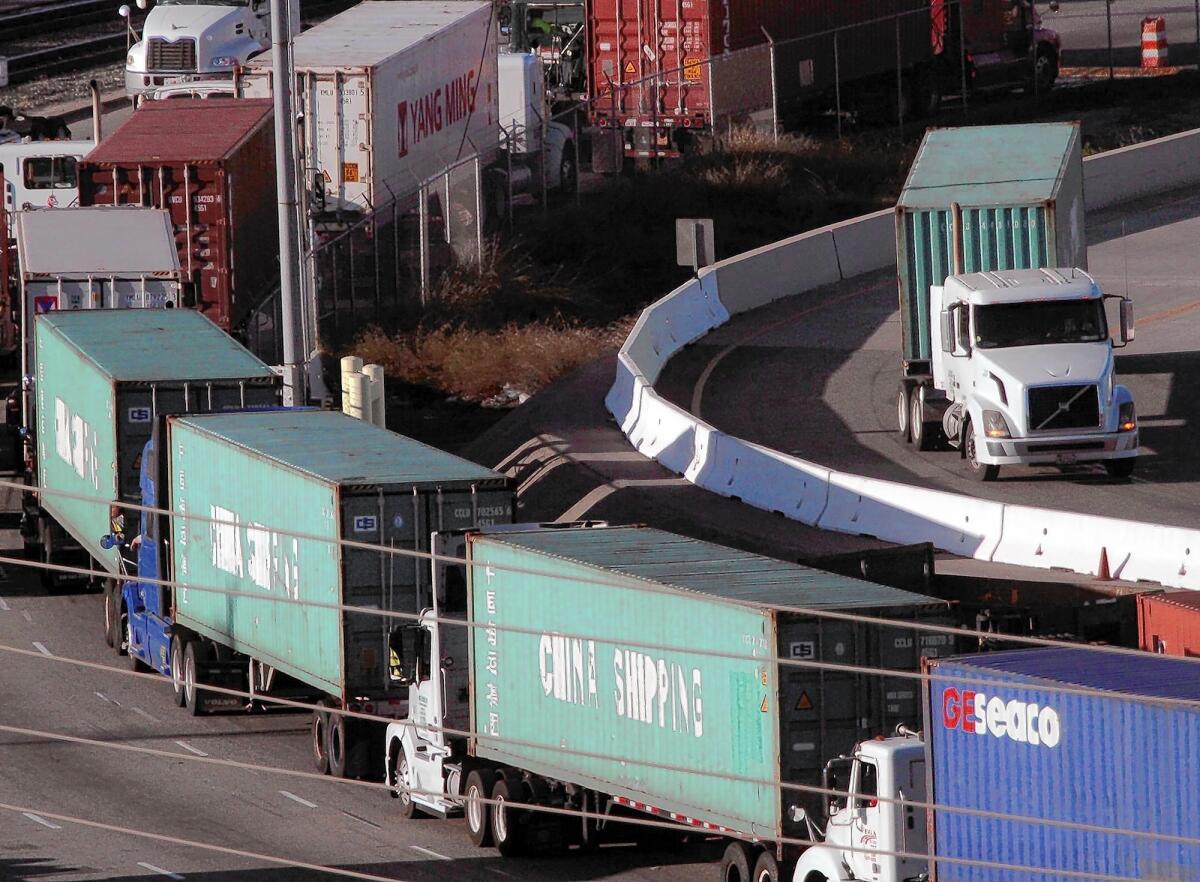Air quality regulators give truckers more time to meet smog standards

- Share via
A day after hearing hours of impassioned testimony from a divided trucking industry, California air quality regulators on Friday postponed deadlines for aging heavy-duty trucks to comply with the nation’s toughest diesel air pollution rules.
The action by the state Air Resources Board will give small fleets, lightly used trucks and those operating in rural areas more time to upgrade to newer, cleaner models or install filters to remove soot from their exhaust.
Officials say the changes will slow pollution cuts for several years but still allow the state to reach its goal of cutting diesel emissions 85% by 2020.
The regulation, adopted in 2008, targets about 1 million diesel trucks that operate in California and are one of the state’s biggest sources of air pollution. The tiny soot particles emitted by diesel engines lodge deep in the lungs and pose serious health risks, particularly in communities near freeways, ports and heavy traffic.
Delays to the state’s deadlines, approved by a 10-1 vote, came after pleas from small trucking firms and owner-operators who became subject to new pollution-cutting requirements for the first time this year and say they have struggled to obtain loans and grants to make the improvements on time.
The amendments were adopted over fierce objections from another segment of the industry: truck owners who have already made the costly upgrades.
In a five-hour, at times boisterous, hearing in Sacramento on Thursday, dozens of truckers spoke against the amendments, telling board members that granting extensions now will put their businesses at a disadvantage by allowing smaller rivals to delay purchases and operate at lower costs.
“My competitors who have not complied are getting the golden ticket,” said Shellie Archer, of Ukiah in Mendocino County, who said she is $3 million in debt after replacing and retrofitting much of her firm’s 64-engine fleet of dump trucks. “I’m getting slapped in the face because I complied and made the investment.”
The 11 board members present also heard from small owner-operators and local air pollution control officers who support granting more time and assistance to truckers if it means more will comply in the long run.
Among those urging regulators to hold to the deadlines were environmental groups and students from Oakland who live near freeways with heavy truck traffic and cope with respiratory illnesses.
“We understand that cleaning up trucks is expensive, but somebody has to pay,” said Pamela Tapia, a community college student from Oakland with asthma. “Right now we’re paying with our health and that’s not right.”
Board members made other small changes to the regulation when they voted Friday morning. They gave one additional year for small fleets to meet one of their deadlines and tightened a provision offering leniency to truckers who were denied loans to reduce the potential for fraud.
California’s aggressive regulation to phase out older, dirty trucks is central to statewide efforts to reduce smog and fine-particle pollution, which are tied to lung and heart disease and higher rates of asthma and respiratory illness. Diesel soot is a toxic air contaminant that is considered by far the largest contributor to cancer risk of any air pollution source in California.
The vote marks the second time the state air quality board has relaxed its diesel truck regulations since 2010, when it made changes to offer the industry relief after the recession.
Air quality officials say the relaxed deadlines will achieve about 93% of the emissions cuts they predicted in 2010. The changes, they say, will not compromise the health benefits of the regulation, which include the prevention of an estimated 3,500 premature deaths and billions of dollars in savings on healthcare costs.
Air Resources Board officials said about 80% of trucks in the state are in compliance with clean-air rules. Some truckers who spoke at the hearing said that estimate seemed too high and called for stronger enforcement.
Twitter: @tonybarboza
More to Read
Sign up for Essential California
The most important California stories and recommendations in your inbox every morning.
You may occasionally receive promotional content from the Los Angeles Times.











